Dr. Anthony Fauci on Wednesday said podcast host Joe Rogan was “incorrect” to say a healthy 21-year-old probably doesn’t need to get vaccinated for COVID-19, pointing to the risk of transmission to others.
“Even if you don’t have symptoms, you are propagating the outbreak because it is likely that you, even if you have no symptoms, that you may inadvertently and innocently then infect someone else who might infect someone who really could have a problem with a severe outcome,” Dr. Fauci, director of the National Institute of Allergy and Infectious Diseases, told NBC’s “Today Show.”
“So if you want to only worry about yourself and not society, then that’s OK,” the doctor said. “But if you’re saying to yourself, even if I get infected, I could do damage to somebody else even if I have no symptoms at all, and that’s the reason why you’ve got to be careful and get vaccinated.”
Data show available COVID-19 vaccines are highly effective at staving off disease and almost certainly reduce transmission, based on promising data from Israel and other places that have seen a reduction in cases alongside their vaccine rollouts.
Mr. Rogan made the comments during his popular Spotify program, “The Joe Rogan Experience.”
“People say, do you think it’s safe to get vaccinated? I’ve said, yeah, I think for the most part it’s safe to get vaccinated. I do. I do,” Mr. Rogan said. “But if you’re like 21 years old, and you say to me, should I get vaccinated? I’ll go no. Are you healthy? Are you a healthy person?”
“If you’re a healthy person, and you’re exercising all the time, and you’re young, and you’re eating well,” he said, “like, I don’t think you need to worry about this.”
COVID-19 tends to produce bad outcomes in older persons.
Mr. Rogan said he is “not diminishing” coronavirus tragedies that have occurred in children, though noted his own children got COVID-19 but didn’t have a hard time.
The comment sparked controversy because it portrayed the pandemic as an individual medical issue instead of a public health crisis with shared responsibility.
Scientists are worried about viral variants that are increasingly impacting younger groups. They also say the longer the virus replicates in humans, there is a risk that new, aggressive variants will emerge and evade existing vaccines.
• Tom Howell Jr. can be reached at thowell@washingtontimes.com.




Please read our comment policy before commenting.